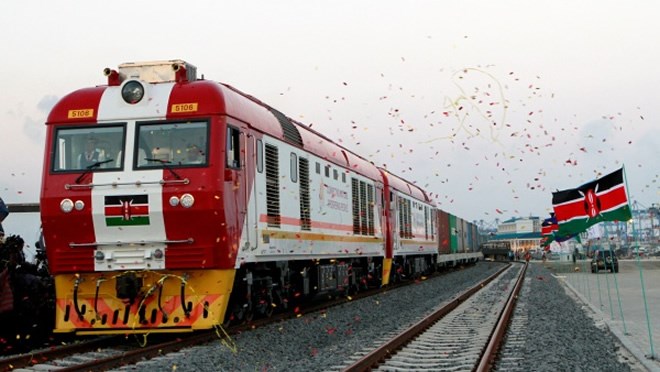
Friday August 18, 2017

A cargo train in Kenya is launched to operate on the Standard Gauge Railway (SGR) line. The project, financed by the Chinese government, will eventually connect nations in the region. Stringer/REUTERS
On August 8, 2017, Kenyan voters went to the polls to choose between leading presidential contenders, incumbent president Uhuru Kenyatta and National Super Alliance (NASA) flag bearer, Raila Odinga. On August 11, the International Electoral Boundaries Commission (IEBC) declared Uhuru Kenyatta the winner. Odinga’s allegation of election fraud has stoked local fears of a repeat of the ethnically charged political violence that took place in the aftermath of the 2007 Kenyan election.
Since this latest election, police have allegedly killed twenty-four Kenyans. Seventeen of the deaths took place in the capital, Nairobi. Police have used teargas at demonstrations by opposition supporters, leading human rights groups, including Amnesty International, to urge professionalism and restraint by all security service members. Amid protests, police violence, and unanswered calls to investigate voting fraud allegations, the situation remains volatile.
Continued instability and violence place Kenya’s neighbors and regional partners within the East African Community (EAC) at risk. Kenya is the de-facto leader of the regional economic bloc, which consists of Kenya, Tanzania, Uganda, Rwanda, Burundi, and South Sudan.
However, many of these policies will become vulnerable if Kenya falls into turmoil. The other EAC countries, especially Uganda and crisis stricken South Sudan, heavily rely on Kenya's Mombasa port for many important material and food imports. Tumult in Kenya could threaten their access, and therefore, economic stability. Foreign companies like IBM and Google, have already established regional offices in Kenya, a regional champion for innovation and digitalization. They will be less likely to pursue increased investment in an insecure region.
Kenyan democracy is seen as a model for the region, but faces an important political test as it considers its next steps. While international observers have widely praised the voting process, the problems for Odinga begin with the vote tally. On August 16, Odinga announced his plans to take his allegations of election fraud to the courts. If his supporters choose to settle their grievances in the streets in the face of an unfavorable Supreme Court ruling, Kenyan democracy will suffer. Democracy in the EAC, like much of Africa, faces significant hurdles as political leaders fuel fears, doubt, and mistrust of democratic processes. As neighboring countries already struggle to toe the democratic line, instability after the Kenya elections could encourage a trend of de-democratization in the region.
Turbulence in the region could threaten the EAC's vision of economic integration between member states. If Kenya is to serve as a democratic model for its neighbors, it must immediately investigate the opposition’s claims of electoral fraud. As other nations, including the U.S., look to work more closely with Africa, they should continue to monitor and support Kenya during this critical time for the region.
Rachael Sullivan is a Master of Public Administration candidate at Columbia University School of International and Public Affairs, and is a currently a Franklin Williams intern at the Council on Foreign Relations.